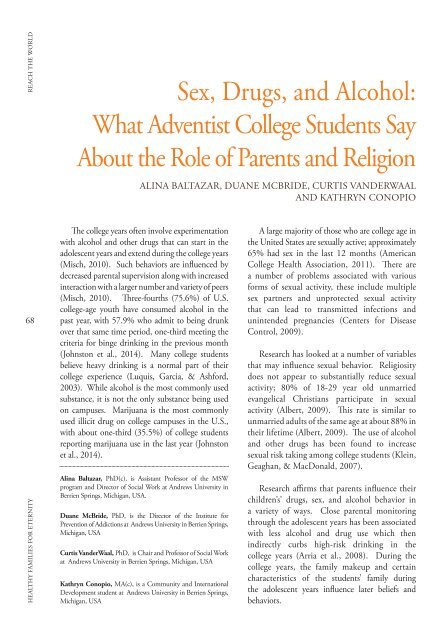HEALTHY FAMILIES FOR ETERNITY
FM_Planbook%202016-eng
FM_Planbook%202016-eng
You also want an ePaper? Increase the reach of your titles
YUMPU automatically turns print PDFs into web optimized ePapers that Google loves.
<strong>HEALTHY</strong> <strong>FAMILIES</strong> <strong>FOR</strong> <strong>ETERNITY</strong> REACH THE WORLD<br />
68<br />
Sex, Drugs, and Alcohol:<br />
What Adventist College Students Say<br />
About the Role of Parents and Religion<br />
ALINA BALTAZAR, DUANE MCBRIDE, CURTIS VANDERWAAL<br />
AND KATHRYN CONOPIO<br />
The college years often involve experimentation<br />
with alcohol and other drugs that can start in the<br />
adolescent years and extend during the college years<br />
(Misch, 2010). Such behaviors are influenced by<br />
decreased parental supervision along with increased<br />
interaction with a larger number and variety of peers<br />
(Misch, 2010). Three-fourths (75.6%) of U.S.<br />
college-age youth have consumed alcohol in the<br />
past year, with 57.9% who admit to being drunk<br />
over that same time period, one-third meeting the<br />
criteria for binge drinking in the previous month<br />
(Johnston et al., 2014). Many college students<br />
believe heavy drinking is a normal part of their<br />
college experience (Luquis, Garcia, & Ashford,<br />
2003). While alcohol is the most commonly used<br />
substance, it is not the only substance being used<br />
on campuses. Marijuana is the most commonly<br />
used illicit drug on college campuses in the U.S.,<br />
with about one-third (35.5%) of college students<br />
reporting marijuana use in the last year (Johnston<br />
et al., 2014).<br />
Alina Baltazar, PhD(c), is Assistant Professor of the MSW<br />
program and Director of Social Work at Andrews University in<br />
Berrien Springs, Michigan, USA.<br />
Duane McBride, PhD, is the Director of the Institute for<br />
Prevention of Addictions at Andrews University in Berrien Springs,<br />
Michigan, USA<br />
Curtis VanderWaal, PhD, is Chair and Professor of Social Work<br />
at Andrews University in Berrien Springs, Michigan, USA<br />
Kathryn Conopio, MA(c), is a Community and International<br />
Development student at Andrews University in Berrien Springs,<br />
Michigan, USA<br />
A large majority of those who are college age in<br />
the United States are sexually active; approximately<br />
65% had sex in the last 12 months (American<br />
College Health Association, 2011). There are<br />
a number of problems associated with various<br />
forms of sexual activity, these include multiple<br />
sex partners and unprotected sexual activity<br />
that can lead to transmitted infections and<br />
unintended pregnancies (Centers for Disease<br />
Control, 2009).<br />
Research has looked at a number of variables<br />
that may influence sexual behavior. Religiosity<br />
does not appear to substantially reduce sexual<br />
activity; 80% of 18-29 year old unmarried<br />
evangelical Christians participate in sexual<br />
activity (Albert, 2009). This rate is similar to<br />
unmarried adults of the same age at about 88% in<br />
their lifetime (Albert, 2009). The use of alcohol<br />
and other drugs has been found to increase<br />
sexual risk taking among college students (Klein,<br />
Geaghan, & MacDonald, 2007).<br />
Research affirms that parents influence their<br />
children’s’ drugs, sex, and alcohol behavior in<br />
a variety of ways. Close parental monitoring<br />
through the adolescent years has been associated<br />
with less alcohol and drug use which then<br />
indirectly curbs high-risk drinking in the<br />
college years (Arria et al., 2008). During the<br />
college years, the family makeup and certain<br />
characteristics of the students’ family during<br />
the adolescent years influence later beliefs and<br />
behaviors.


